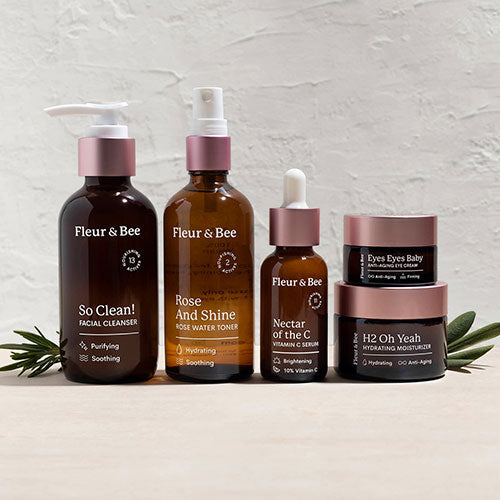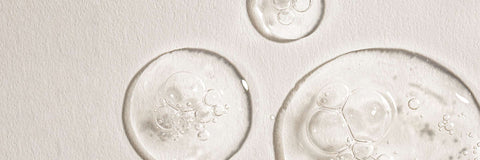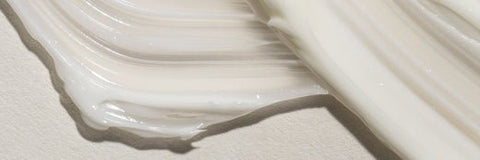Parabens are one of those “nasty” ingredients that we not only never include in our formulas, but also strongly urge you to dodge at all costs. You may be asking what are parabens, why are parabens in skincare, and what makes them oh-so villainous? Stick with us to learn more.
IN A NUTSHELL
Main Takeaways: Parabens in cosmetics, skincare, and some foods are added as preservatives to prolong shelf life. While their function is to stave off things like bacteria and mold, they themselves may pose some dangers that are worth avoiding.
Good to Know: While folks may argue that some parabens may be naturally occurring, any product’s claims that the parabens therein are of “natural” origin do not negate their potential dangers. Consider these words misleading and discount any associated claims.
Recommended Products: All Fleur & Bee products are paraben free.
What Are Parabens?
This class of chemicals, often found in cosmetics and personal care products, have been known to appear in pretty much anything– cleansers, creams, hair care, shower gels, hand soap, facial masks, you name it. Even some household products, medications, and select processed foods may harbor parabens. At a first glance, their purpose will position them as nothing short of heroic: parabens function as preservatives and work to prevent the growth of bacteria, fungus, mold, and other yucks, thereby prolonging the shelf life of your favorite formulas and keeping them fresh and functional for as long as possible. No one wants one hasty, mindless, less-than-immaculate finger dip into your most prized apothecary jar to prematurely render the entire pot trash-worthy. Parabens kinda seem like godsends. So, what’s all the fuss?
Should Parabens Be Avoided?
We won’t mince words; plain and simple, we think parabens are a no-no. There are a few reasons for this. The first being, as a purveyor of clean skincare, we never incorporate parabens into our formulas and still yield high performing, paraben-free products, with shelf lives equal to their paraben-laden counterparts. So, we see no reason to include such a controversial ingredient. If an unnecessary additive is raising eyebrows, then we feel extra passionate about avoiding it. Parabens are no exception. On a more granular level, parabens definitely inspire some health-related concerns, which is the reason behind all the controversy in the first place.
Parabens are recognized as “safe” by the Food and Drug Administration. Yet, an increasing body of evidence points to the contrary. Recent studies clearly indicate that parabens, which are most often encountered through the skin (as in the case of cosmetic or skin care application), do not simply sit on the skin, but rather are absorbed and then stored. In fact, a study of female subjects aimed at determining maintained levels of bodily parabens showed that the overwhelming majority of women involved (19 out of 20) had parabens stored in their breast tissue - of all places! This naturally raises concerns about parabens’ ability to lead to cancer and researchers are on a mission to determine clinical links, if any. It is also understood that parabens may accumulate over time and store themselves long term in bodily fat tissue, as amounts detected correlated directly with age.
Parabens in skincare have also been linked to allergies. The larger challenge presents when one considers the impressive staying power of parabens and their ability to be stored in deep tissue. In this way, the body may get little reprieve in terms of exposure. This could result in continuous, overactive immune responses and lead to things like unexplained increased inflammation in the body, as well as undesirable skin symptoms like redness and irritation.
The most worrisome of all paraben-related concerns may be the fact that research continues to indicate that parabens may disrupt the natural order of one’s endocrine system, interfering with hormone function and processing. Parabens appear to mimic estrogen in the body, which could theoretically lead to very serious complications like reproductive challenges, infertility, abnormal birth outcomes, developmental disturbances in young children, and even heightened cancer risk in adults, particularly women. Further, studies indicate that parabens can alter gene expression, including those in breast cancer cells, potentially accelerating their growth and advancing the cancer at augmented rates.
It is true that researchers want and need to collect enormous piles of data before making overarching definitive claims, which is potentially why parabens are still regarded as non-threatening by certifying bodies… innocent until proven guilty and so forth. But plainly put, nothing about any of the aforementioned feels safe to us.
Ok, But What About “Natural” Parabens?
There are a number of claims out there that some parabens are naturally occurring in certain whole foods, like carrots or blueberries. But exhaustive research suggests that these are not parabens per say, but rather related molecules whose construction is significantly dissimilar, resulting in different characteristics. While it is thought that particular environmental conditions may allow for certain plant species to then convert said molecules into parabens, there is almost no scientific literature on naturally occurring or natural sources of parabens to legitimize such claims.
Maybe more importantly, no matter their origin, parabens in skincare still behave as they do in the human body, which is categorically a cause for concern. Any claims that a product’s parabens are of “natural” origin do not negate their potential dangers. Such words are merely tactical, misleading marketing efforts and, for the sake of your skin and whole-body wellness, should be discounted.
Saying “NO!” to Parabens
It’s important to know what to look for when reading ingredients labels. The parabens most commonly found in skin care, cosmetics, and other personal care products include methylparaben, ethylparaben, propylparaben, and butylparaben.
However, there are times when you may not have to, at least not for the sole purpose of rummaging for parabens. Thankfully, more and more brands and retailers are exercising integrity when it comes to nefarious ingredients and are turning operations upside down to help you say “no” to parabens in particular. Places like Whole Foods Market have banned the selling of products that include any of the four most commonly used parabens. Both CVS and Target have also removed all parabens from their store brands’ personal and skin care products. And lest you forget that you can always hit up the entire Fleur & Bee line for for products that have always been, will always be, paraben free!
If it’s time to ditch the paraben-laden items you have on your shelf, start with our 5 step Deluxe Set, which includes your entire skincare routine, from start to finish.





